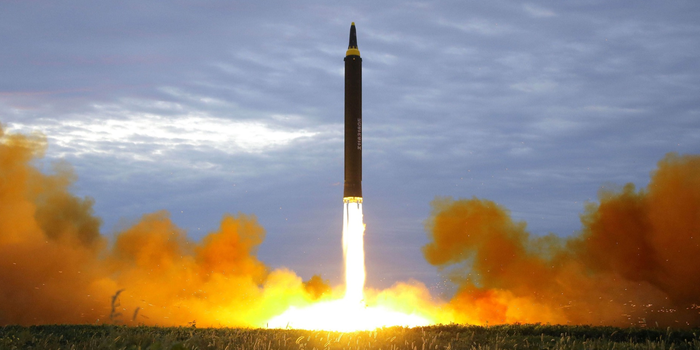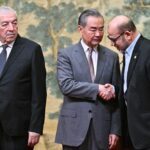Joseph S. Nye’s article emphasizes the critical importance of nuclear non-proliferation, citing historical lessons and contemporary geopolitical challenges. He argues that, although it may be difficult to completely eliminate nuclear weapons, a world with fewer nuclear-armed states is significantly safer.
Nye references Avril Haines, the US Director of National Intelligence, who recently noted that Russia’s need for support amid the Ukraine conflict has led it to make concessions to China, North Korea, and Iran, undermining non-proliferation norms. He acknowledges that some theorists believe nuclear proliferation can act as a stabilizing force, but he argues against this notion by invoking President John F. Kennedy’s warnings from the 1960s about the dangers of widespread nuclear armament.
Despite the challenges, the Non-Proliferation Treaty (NPT) has been relatively successful, with only nine countries currently possessing nuclear weapons, contrary to earlier predictions of many more states developing such capabilities. Nye points out that while there have been instances where countries like Israel, India, and Pakistan have developed nuclear weapons outside the NPT framework, the overall rate of proliferation has been slower than feared, which enhances global stability.
Nye also reflects on past efforts to curb proliferation, such as during the Carter administration when measures were taken to limit the spread of plutonium reprocessing technology. These efforts, despite facing significant opposition, were crucial in preventing a broader proliferation of nuclear weapons.
The article concludes by stressing the importance of continuing non-proliferation efforts, even in the face of contemporary challenges posed by nations like North Korea and Iran, and geopolitical shifts driven by Russia’s recent actions.
Read more below.
The Non-Proliferation Problem
Those harboring doubts about the viability of nuclear non-proliferation ought to consider the lessons of the past 75 years. Even if it proves impossible to contain this catastrophically destructive technology completely, a world with fewer nuclear-armed states is exponentially safer than one with many of them.
CAMBRIDGE – Avril Haines, the US Director of National Intelligence, recently warned that “Russia’s need for support in the context of Ukraine has forced it to grant some long-sought concessions to China, North Korea, and Iran with the potential to undermine, among other things, long-held non-proliferation norms.”
How much does this matter? Some theorists have long been skeptical about efforts to limit the spread of nuclear weapons, even arguing that proliferation can be a stabilizing force. If the horrors associated with nuclear weapons are one reason why there have been no wars between great powers since 1945, they argue, perhaps the same effect can be replicated at the regional level. India and Pakistan developed a nuclear balance in the 1990s, and there have been no disastrous consequences so far.
But would prudence still prevail in a world of “nuclear-armed porcupines?” US President John F. Kennedy did not think so. As he put it during a March 1963 press conference,
“With all of the history of war, and the human race’s history, unfortunately has been a good deal more war than peace, with nuclear weapons distributed all through the world, and available, and the strong reluctance of any people to accept defeat, I see the possibility in the 1970’s of the President of the United States having to face a world in which 15 or 20 or 25 nations may have these weapons. I regard that as the greatest possible danger and hazard.”
Later that year, Kennedy signed a treaty banning atmospheric nuclear testing, setting the stage for the 1968 Non-Proliferation Treaty (NPT), which now has 191 members. The treaty’s five recognized nuclear-weapons states – the United States, the Soviet Union, Britain, France, and China – pledged not to spread nuclear weapons, and its 186 other members pledged not to develop them. Israel, India, and Pakistan refused to sign the NPT and did develop nuclear weapons; North Korea signed the treaty but then withdrew to develop its nuclear program.
That brings the total of nuclear-armed states to nine, which is far from perfect, but much better than Kennedy predicted. Defenders of this imperfect regime argue that the rate of spread is as important as the number of states possessing the bomb, because greater predictability improves the prospect of maintaining stability. Already, Saudi Arabia has threatened to develop nuclear weapons if Iran does. If there are regional cascades of new nuclear-armed states, the probability of accidents and miscalculations would increase substantially.
Haines explicitly mentioned Iran and North Korea. Both had been under United Nations sanctions in which China, Russia, and the West cooperated. Until recently, Russia had a long history of supporting non-proliferation. Not only did it sign the NPT, but it also adopted the 1978 Nuclear Suppliers Group Guidelines, under which vendors of civil nuclear equipment agreed to exercise prudence in their export policies. Now that Vladimir Putin is becoming dependent on North Korean military supplies to sustain his war in Ukraine, however, he has ended Russia’s cooperation on non-proliferation.
While Iran has long had a nuclear-weapons program based on enriched uranium, it has gone through fits and starts in response to external pressures. The regime has been careful to keep its production of highly enriched uranium below the threshold needed to produce a nuclear arsenal. But with Russia relying on Iranian drones, China relying on Iranian oil, and Donald Trump having foolishly scrapped the Iran nuclear deal in 2018, international cooperation on non-proliferation has broken down here, too.
Moreover, some believe (probably mistakenly) that Russia would not have invaded Ukraine if the Ukrainians had kept the nuclear weapons that they inherited when the Soviet Union collapsed. If this assumption gains traction, the prospects for non-proliferation will worsen.
I am reminded of a similar situation in the past (which I recollect in my memoir, A Life in the American Century). Following the oil crisis of 1973, the conventional wisdom was that the world would need to turn to nuclear energy. But because many believed (incorrectly) that the world was running out of uranium, everyone set their sights on reprocessed plutonium – a by-product of burning uranium in nuclear reactors.
Forecasts at the time suggested that some 46 countries would be reprocessing plutonium by 1990. If so, the world would be awash in weapons-grade material, and the risk of nuclear proliferation and nuclear terrorism would increase catastrophically. In 1974, India became the first state beyond the five listed in the NPT to launch what it euphemistically termed a “peaceful nuclear explosion.”
Soon thereafter, France agreed to sell a plutonium-reprocessing plant to Pakistan, where Prime Minister Zulfikar Ali Bhutto had vowed that his country would eat grass before letting India develop a nuclear monopoly in South Asia. In Latin America, Germany was selling a uranium-enrichment plant to Brazil, and Argentina was looking at plutonium. As many other countries quietly explored their options, it appeared as if a nuclear-arms race was underway.
Fortunately, it never materialized. US President Jimmy Carter pursued a non-proliferation policy that succeeded in slowing the momentum. Only two additional countries have developed the bomb since the 1970s, rather than the 25 that Kennedy feared. While everyone assumed that not much could be done about proliferation, Carter thought otherwise. Thanks to his administration’s efforts, the French-Pakistani and German-Brazilian deals were scuttled. The US created an international commission to study the nuclear fuel cycle, and this reduced momentum toward reprocessing plutonium and the use of “breeder reactors.”
Those harboring doubts about the viability of non-proliferation ought to consider this lesson from history. Even if proliferation cannot be stopped, it can be slowed, and that can make all the difference.








CAMBRIDGE – Avril Haines, the US Director of National Intelligence, recently warned that “Russia’s need for support in the context of Ukraine has forced it to grant some long-sought concessions to China, North Korea, and Iran with the potential to undermine, among other things, long-held non-proliferation norms.”
How much does this matter? Some theorists have long been skeptical about efforts to limit the spread of nuclear weapons, even arguing that proliferation can be a stabilizing force. If the horrors associated with nuclear weapons are one reason why there have been no wars between great powers since 1945, they argue, perhaps the same effect can be replicated at the regional level. India and Pakistan developed a nuclear balance in the 1990s, and there have been no disastrous consequences so far.
But would prudence still prevail in a world of “nuclear-armed porcupines?” US President John F. Kennedy did not think so. As he put it during a March 1963 press conference,
“With all of the history of war, and the human race’s history, unfortunately has been a good deal more war than peace, with nuclear weapons distributed all through the world, and available, and the strong reluctance of any people to accept defeat, I see the possibility in the 1970’s of the President of the United States having to face a world in which 15 or 20 or 25 nations may have these weapons. I regard that as the greatest possible danger and hazard.”
Later that year, Kennedy signed a treaty banning atmospheric nuclear testing, setting the stage for the 1968 Non-Proliferation Treaty (NPT), which now has 191 members. The treaty’s five recognized nuclear-weapons states – the United States, the Soviet Union, Britain, France, and China – pledged not to spread nuclear weapons, and its 186 other members pledged not to develop them. Israel, India, and Pakistan refused to sign the NPT and did develop nuclear weapons; North Korea signed the treaty but then withdrew to develop its nuclear program.
That brings the total of nuclear-armed states to nine, which is far from perfect, but much better than Kennedy predicted. Defenders of this imperfect regime argue that the rate of spread is as important as the number of states possessing the bomb, because greater predictability improves the prospect of maintaining stability. Already, Saudi Arabia has threatened to develop nuclear weapons if Iran does. If there are regional cascades of new nuclear-armed states, the probability of accidents and miscalculations would increase substantially.
Haines explicitly mentioned Iran and North Korea. Both had been under United Nations sanctions in which China, Russia, and the West cooperated. Until recently, Russia had a long history of supporting non-proliferation. Not only did it sign the NPT, but it also adopted the 1978 Nuclear Suppliers Group Guidelines, under which vendors of civil nuclear equipment agreed to exercise prudence in their export policies. Now that Vladimir Putin is becoming dependent on North Korean military supplies to sustain his war in Ukraine, however, he has ended Russia’s cooperation on non-proliferation.
While Iran has long had a nuclear-weapons program based on enriched uranium, it has gone through fits and starts in response to external pressures. The regime has been careful to keep its production of highly enriched uranium below the threshold needed to produce a nuclear arsenal. But with Russia relying on Iranian drones, China relying on Iranian oil, and Donald Trump having foolishly scrapped the Iran nuclear deal in 2018, international cooperation on non-proliferation has broken down here, too.
Moreover, some believe (probably mistakenly) that Russia would not have invaded Ukraine if the Ukrainians had kept the nuclear weapons that they inherited when the Soviet Union collapsed. If this assumption gains traction, the prospects for non-proliferation will worsen.
I am reminded of a similar situation in the past (which I recollect in my memoir, A Life in the American Century). Following the oil crisis of 1973, the conventional wisdom was that the world would need to turn to nuclear energy. But because many believed (incorrectly) that the world was running out of uranium, everyone set their sights on reprocessed plutonium – a by-product of burning uranium in nuclear reactors.
Forecasts at the time suggested that some 46 countries would be reprocessing plutonium by 1990. If so, the world would be awash in weapons-grade material, and the risk of nuclear proliferation and nuclear terrorism would increase catastrophically. In 1974, India became the first state beyond the five listed in the NPT to launch what it euphemistically termed a “peaceful nuclear explosion.”
Soon thereafter, France agreed to sell a plutonium-reprocessing plant to Pakistan, where Prime Minister Zulfikar Ali Bhutto had vowed that his country would eat grass before letting India develop a nuclear monopoly in South Asia. In Latin America, Germany was selling a uranium-enrichment plant to Brazil, and Argentina was looking at plutonium. As many other countries quietly explored their options, it appeared as if a nuclear-arms race was underway.
Fortunately, it never materialized. US President Jimmy Carter pursued a non-proliferation policy that succeeded in slowing the momentum. Only two additional countries have developed the bomb since the 1970s, rather than the 25 that Kennedy feared. While everyone assumed that not much could be done about proliferation, Carter thought otherwise. Thanks to his administration’s efforts, the French-Pakistani and German-Brazilian deals were scuttled. The US created an international commission to study the nuclear fuel cycle, and this reduced momentum toward reprocessing plutonium and the use of “breeder reactors.”
Those harboring doubts about the viability of non-proliferation ought to consider this lesson from history. Even if proliferation cannot be stopped, it can be slowed, and that can make all the difference.